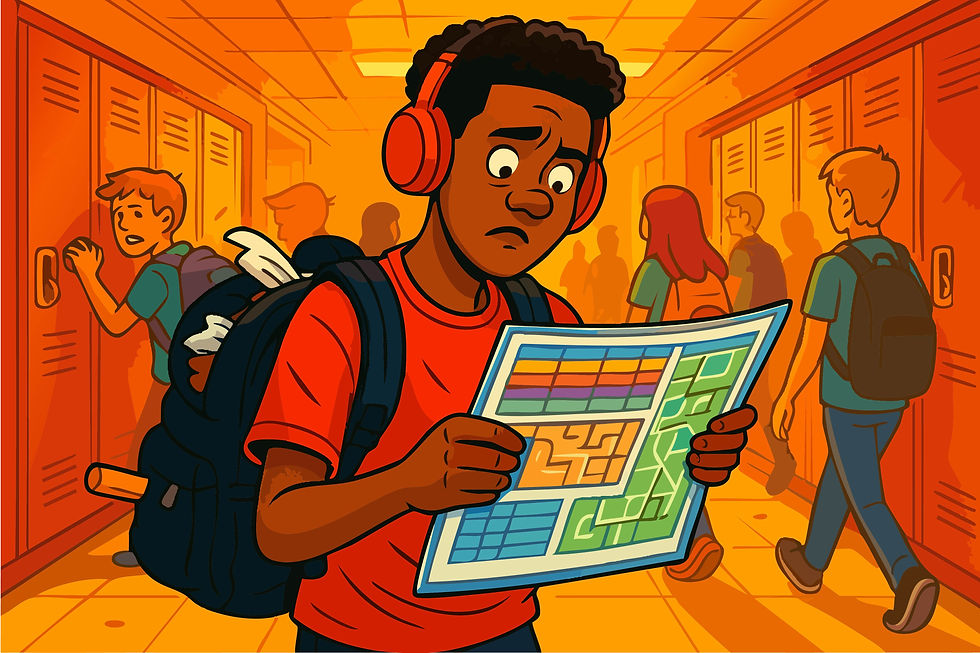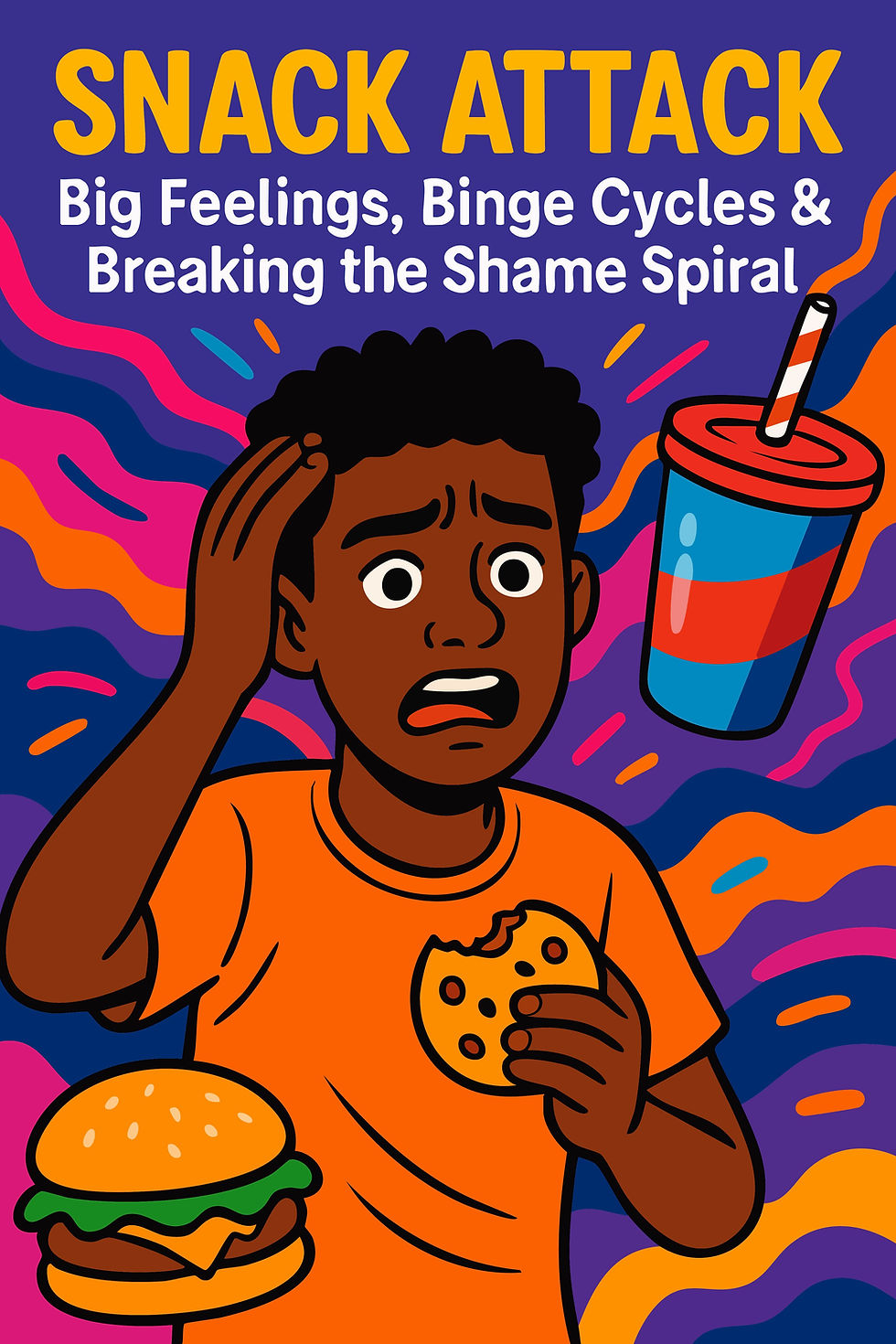Freshman, Not Fresh Meat: Surviving High School with ADHD (and a Drumstick in Your Pocket)
- Tara Gentile
- Aug 5, 2025
- 7 min read

There’s a universal truth about change: it’s hard. But for a neurodivergent kid, change isn’t just hard—it’s a full-contact sport with bonus rounds of meltdowns, misplaced paperwork, and possibly tears (yours).
When you’ve got ADHD or Autism in the mix, routines aren’t just helpful—they’re oxygen. They keep the chaos at bay. So, when the new school year blows in with its fresh teachers, strange classrooms, and unfamiliar hallways, it’s like ripping the oxygen mask off mid-flight.
And what about those “big” transitions? Elementary to middle school feels like upgrading from a campfire to a barbecue pit—you’re suddenly dealing with lockers for the first time (aka metal anxiety boxes), switching classes every 45 minutes, and trying to remember which teacher doesn’t allow gum. It’s a lot.
Middle school to high school? That’s full-on fire-walking while juggling flaming swords… and someone’s grading you on form. The buildings are bigger, the expectations are higher, and the margin for error is smaller. They expect independence, maturity, and common sense—basically, a trifecta my ADHD kid treats like class electives.
Welcome to the High School Hunger Games—may the odds, and your kid’s executive functioning, be ever in your favor.
Medication Distribution: High Stakes and a $15 Alarm Watch
Survival in the High School Hunger Games starts with the basics—like making sure the kid actually gets their ADHD meds on time without me playing human reminder app.
One of my big high school parenting goals is teaching Kei to take ownership of his own medication. In elementary and middle school, the nurse called him when it was time, like some sort of ADHD fairy godmother making sure the pill-to-brain connection happened.

But high school? Whole new ball game. There’s no “paging Kei” over the loudspeaker, and I’m not there to play personal reminder service. Enter: the $15 old-school digital watch. No cell phones allowed during class? No problem. I set that thing to beep at the exact minute he needs to head to the nurse’s office.
When the alarm goes off, he knows—stop what you’re doing, grab your pass, and go. In theory, it’s a flawless system. In reality, sometimes he just… turns it off and then immediately forgets that it ever went off in the first place. Poof. Gone—like my dreams of marrying wealthy. Which is exactly why we’re doing this: he has to learn that managing his own meds is his responsibility —not mine, not the nurse’s, not some overly helpful classmate who thinks they’re auditioning for “Best Supporting Role in Your Academic Career.”
It’s one of those unglamorous but essential survival skills that separates a freshman from fresh meat—knowing when to get what you need, without waiting for someone to save you. Because in high school, no one’s going to chase you down with your pill bottle.
It’s all part of the bigger independence plan—if he can get this down now, by the time he’s out in the real world, he’ll (hopefully) remember to take his meds before important things… like job interviews, dates, or big drum solos.
The 504 Lifeline: Your Kid’s Legal Force Field
Next up in our survival toolkit: the 504 plan. If you’re parenting a neurodivergent kid, you probably know what this is. If you’re new here—welcome, pull up a chair, and let me save you hours of frantic Googling.

A 504 plan is a legally binding document outlining specific accommodations for your child. Legally binding is the key phrase here—because once you and the school sign off, teachers are required by federal law to follow it. No “ifs,” no “buts,” and no “oops, I forgot.”
Every August, I schedule a meeting with the counselor or assistant principal to walk through Kei’s 504 plan. Then I go through it again—with Kei. He needs to know exactly what’s on it and why it matters. The older he gets, the more I want him to understand that this isn’t just a piece of paper—it’s his personal legal force field.
And high school? That’s when he really needs to start using it. Because “freshman, not fresh meat” means knowing your rights and (eventually) being able to speak up when you’re not getting them. Right now, Kei isn’t exactly a natural self-advocate—this is the same kid who once let someone cut in front of him in the lunch line because “they seemed hungry.” But the goal is for him to be able to stand up for himself before graduation, not just when the last slice of pizza is at stake.
Schedules & Maps: My Type-A Masterpiece vs. Reality
Another freshman survival essential? Knowing where you’re going. Which sounds basic—until you hand an ADHD kid a carefully crafted, color-coded schedule and watch it come home on day one looking like it survived a paper shredder accident.
I don’t play around with these schedules. I go full Type-A: color codes, times, room numbers, and a school map on the back with each classroom highlighted and labeled by period. It’s a work of art. In years past, Kei has assured me he “found everything fine,” only to admit on day two that he got lost, was late, and maybe wandered into the wrong class for an entire period without realizing it.
But THIS YEAR? We’re going big. We’re laminating. That’s right—no folding, no tearing, no “it got wet in the rain,” no “I left it in my pocket and it went through the wash.” If it gets lost, it’ll get lost in pristine condition.
Because in the High School Hunger Games, wandering aimlessly between classes is like stepping on one of those arena landmines—instant game over, and everyone saw it happen.
Lockers: The ADHD Black Hole
Ah, lockers. For most freshmen, they’re just a place to stash your books. For an ADHD freshman, they’re a shiny, metal anxiety trap.

Kei barely uses his locker. Why? The combination. Left to zero. Pass the first number twice. Right to the second. Left again. Land exactly on the third. It’s basically the Da Vinci Code—only with more time pressure and fewer ancient secrets. And this is a kid who still has to do the “L” test with his fingers to figure out left from right—a great trick, unless you’re in a crowded hallway with 45 seconds to make it to class. Under time pressure, it’s a recipe for disaster.
On the rare occasion he does open it, it’s less “organized storage” and more “magpie’s nest.” We’re talking random pens, a broken highlighter cap, a hair clip that isn’t his, a paperclip attached to a mystery chain, and at least one unidentifiable object that I’m 80% sure came from the teacher's lounge.
It’s also prime “fresh meat” territory. In High School Hunger Games terms, fiddling with a locker combo while the hallway stampedes around you is like stopping to tie your shoe in the middle of the arena—you’re distracted, vulnerable, and someone’s already eyeing your supplies. Which is exactly why Kei avoids his locker altogether. Sure, his backpack looks like he’s prepping for the apocalypse, but at least he’s not getting metaphorically “axed” before third period.
Social Anxiety: The Silent Arena
High school isn’t just academics and locker combinations—it’s an all-day social obstacle course. For a lot of ADHD and neurodivergent kids, the academics are challenging, but the social part? That’s the part that can feel like walking through the arena blindfolded.
Kei’s not shy exactly, but throw him into a cafeteria packed with 400 kids and he’ll suddenly find the floor tiles very interesting. New friend groups, unfamiliar lunch routines, figuring out who to sit with—it’s a minefield. And the thing about high school is, everyone assumes you know the “rules” even when no one actually hands them to you.
One of the best decisions we made was getting him into marching band. I figured that would be his people—band kids “march” to their own beat (pun intended). On their own, they might seem a little odd, a little off-kilter, maybe even “quirky” in that way adults say when they’re trying to be polite. But when you put them all together? That “weird” stops being weird—it becomes the norm. They’re the same kind of different, and in that sameness, they’re a perfect blend that somehow makes music (and occasionally noise) in sync. Whether it’s their shared love of music or their shared need to escape PE for a semester, they bond.

For Kei, marching band started two weeks before school—ten full days, 8:30 to 5:30, of playing music, sweating under the sun, and, most importantly, making friends before the first bell of high school ever rang. By the time the first day hit, he already had a built-in community, and when you’re a freshman, walking into school knowing even one familiar face can feel like carrying a shield into the arena.
If band isn’t your kid’s thing, look for something else that starts before the school year—sports, drama club, robotics—anything that lets them adjust among a smaller group of like-minded kids before being thrown into the main arena.
Here's the best advice I've got:
Find an anchor early. This could be one familiar face in the crowd, a teacher they click with, or a lunch spot that feels safe.
Practice small talk at home. I know—your teen will love this (cue eye roll), but it helps grease the wheels for real-life moments.
Encourage low-pressure connections. Clubs, band, sports—anything that puts them in a shared-interest setting can be a shortcut past the awkward “so… you like… stuff?” phase.
Because in the High School Hunger Games, social anxiety isn’t just a side quest—it’s a stealth challenge. And the best way to avoid becoming “fresh meat” is to make sure your kid finds their people before the first day.
The Hopeful Ending To An ADHD Freshman's Survival
Surviving freshman year with ADHD isn’t about perfect grades, flawless organization, or suddenly developing an adult-level grasp of time management. It’s about building just enough systems, skills, and safe zones to keep them from getting metaphorically “axed” before second semester.
For Kei, that means a $15 alarm watch for meds, a laminated map-and-schedule masterpiece, a 504 plan that works like a legal force field, and a hard pass on locker use. But the real secret weapon? Finding his people.
Because here’s the thing—whether it’s marching band, robotics club, drama, or the cross-country team, the goal is the same: surround your kid with others who are the same kind of different. When you’ve got that, the weird stops being weird, and the freshman stops feeling like fresh meat. It becomes their normal, their safe zone—their arena alliance that keeps them in the game.
And yes, high school will still have moments that feel like sprinting toward the Cornucopia without a plan. But with a little preparation, a few solid allies, and the knowledge that even in the Hunger Games there are people rooting for you, your kid can survive—and maybe even thrive—with a drumstick in their pocket and a community at their back.
—Tara
District Parent of ADHD Tribute #1
504 Plan Enforcer
Former Dreamer of Marrying Wealthy





Comments